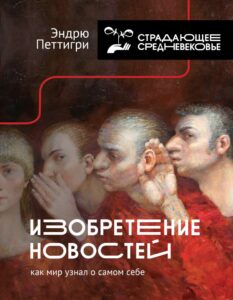Описание книги
About the Product A fundamental story of the evolution of news, from the exchange of manuscripts in the late Middle Ages to the era of triumph of the print media. A novelty in the popular book series “History and Science of Runet. The Suffering Middle Ages «. The book contains many graphic reproductions and illustrations on the theme of the Medieval era. On the back cover of the book there is a detailed review of the famous political scientist and teacher Ekaterina Shulman: “Pilgrims, merchants, pamphlets, private letters, street ballads, fair rumors and city gossip were tools for creating and circulating news long before the media and elements of social networks before the Internet Political discussions in coffee shops, the first newspapers, the emerging media empires and the people of the printed word realizing their power ̶ the subject of the book of the British historian Andrew Pettigry. reading humanity, which never gets tired of being interested in itself and realizing itself, reflected in the mirrors of its own invention. » Abstract The book by Andrew Pettigrey, professor of modern history at the University of St Andrews and acclaimed Renaissance writer, was first published in 2015 and received rave reviews from critics and the American media. The New Yorker magazine called it a «revelatory story,» and literary critic Adam Kirsch noted that the book is «an outstanding introduction to the past that helps us understand our future.» The author covers a period of almost four centuries — from the pre-press era to 1800, from the end of the Middle Ages to the French Revolution, exploring in detail the instinct of people to seek news and the desire to be informed. A fascinating panorama of centuries opens before the reader with a truly multimedia exchange, which has absorbed all available means of disseminating news — conversations and rumors, civil ceremonies and celebrations, church sermons and proclamations in the squares, and with the onset of the printing era — pamphlets, ballads, newspapers, etc. leaflets.
FAQ
